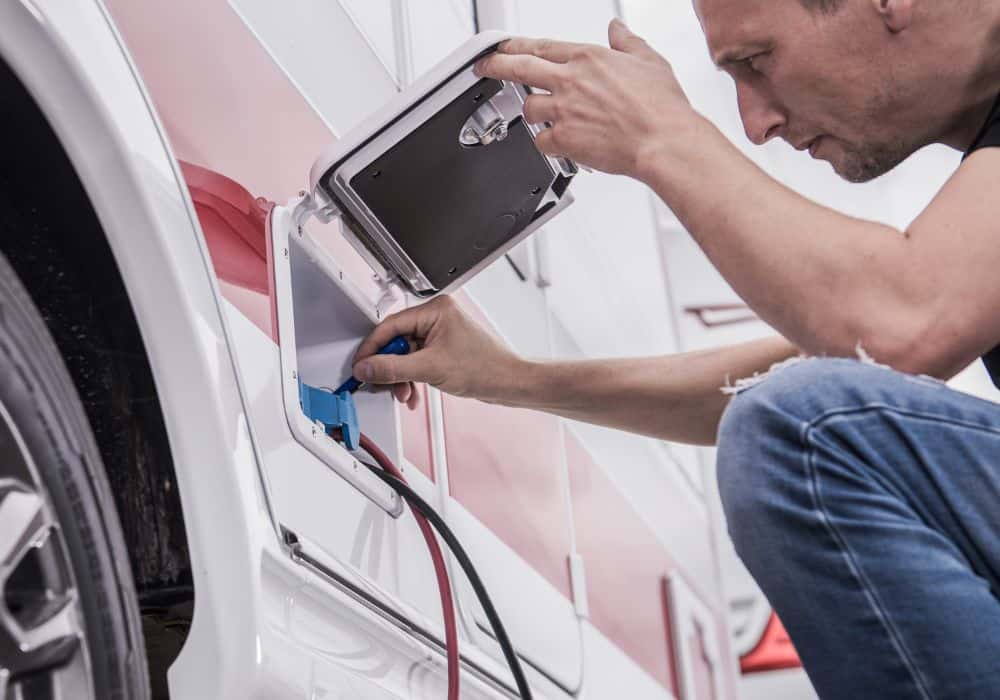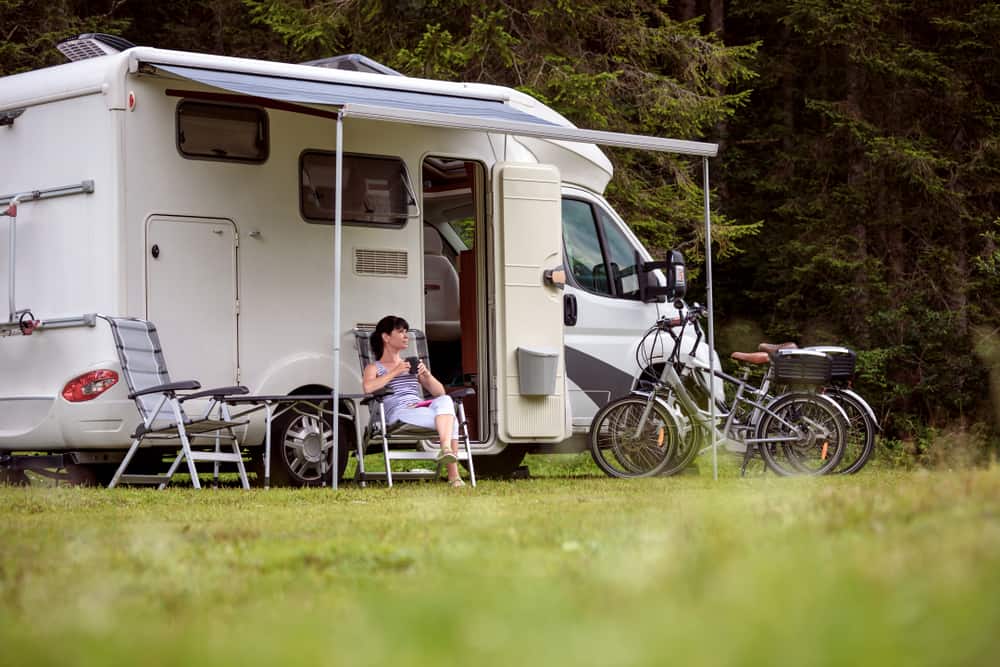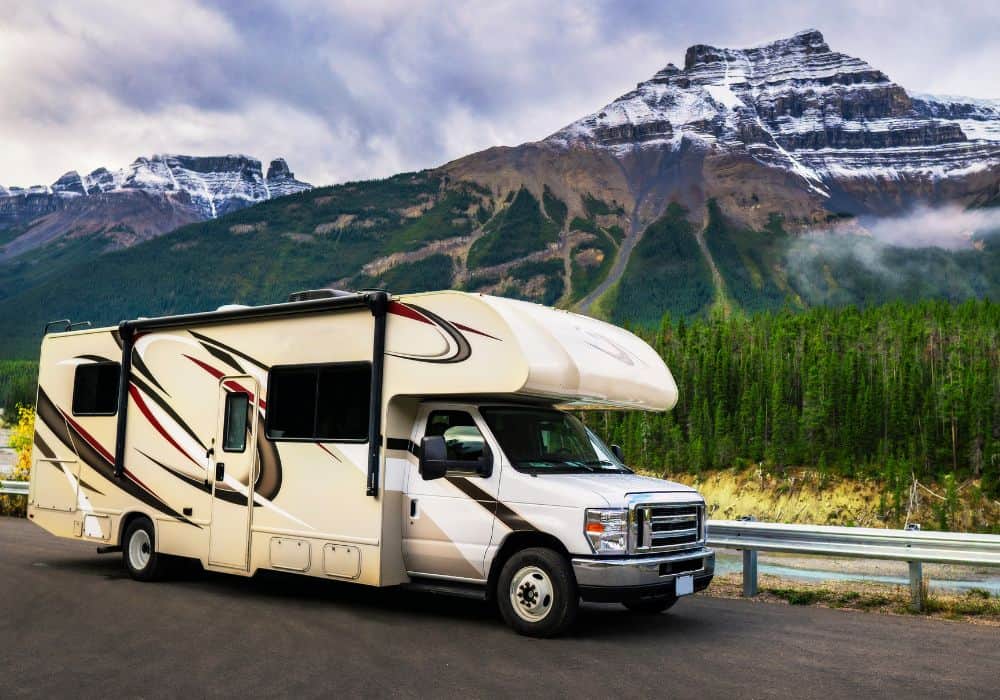Unfortunately, when you’re on the road, there are a lot of things that can go wrong with your RV. One common issue is not being able to charge the battery. This can be a frustrating problem to solve, but we are here to help!
In this blog post, we will discuss the causes of this issue and how to fix it. We will also cover some general aspects of RV maintenance. So sit back and buckle up – let’s discuss why your camper is not charging the battery!
Table of Contents
The Basics of Campers and Their Battery Systems
Campers, also called motorhomes or RVs, come in all shapes and sizes, but most have one thing in common – they have electrical systems that require two or more batteries in order to operate. These batteries are responsible for not only starting the RV, but also powering the RV’s lights, appliances, water pump, and other devices. Most RVs have two types of batteries: the starter battery and the house battery.
Starter Battery
The RV starter battery is also known as a chassis battery, and they are used to start your RV’s engine, as the name would imply. They also power other vehicle-related accessories, such as headlights and windshield wipers.
They are designed to provide a large amount of power for a short period of time. They should not be discharged below 50% of their capacity, as this will damage the battery.
The best kind of chassis battery for your RV is a lead-acid battery. Lead-acid batteries are made of lead and other metals in a sulfuric acid solution. They can be Gel, AGM, or another kind of high cranking amp battery.
Over time, however, the lead and other metals will corrode and break down, which reduces the battery’s capacity to hold a charge. Lead-acid batteries typically last around 5 to 7 years if they are well maintained.
House Battery
The RV house battery is the battery that – you guessed it – runs the appliances and devices within the “house” of the RV. It is generally stored in a concealed location, such as a cabinet, and it runs the appliances like the microwave and refrigerator, devices like your TV, and other necessary features such as the overhead lights, water pump, and inverters.
It is a 12-Volt battery, and there’s sometimes more than one. It is typically a deep-cycle battery, which is designed to store power, deeply discharge it, and then get recharged many times without damage. The best type of battery for this job is a lithium battery.
If your RV is the kind that you hitch up and tow behind you, then you won’t need a starter battery. In this case, the RV trailer battery you’d need is a house battery.
What Causes an RV Battery to Stop Charging?
There are a few different reasons why your RV’s battery may not be charging. We will discuss the most common causes below.
1. Corroded or Damaged Battery Terminals
One of the most common reasons for an RV battery not charging is corrosion or damage to the battery terminals. The terminals are the metal battery posts on top, where the positive and negative cables are attached.
Over time, the battery terminals can become corroded from exposure to the elements. Corrosion can also build up on the inside of the cable clamps, which can cause them to loosen and fall off. Both of these issues can prevent the cables from making a good connection to the battery, which will prevent it from charging.
If you suspect that your RV’s battery terminals are damaged or corroded, you should disconnect the battery cables, and then clean them with a wire brush or replace them entirely.
2. Blown Fuse or Tripped Circuit Breaker
Another common reason for an RV battery not charging is a blown fuse or tripped circuit breaker. The fuses and breakers are responsible for protecting the electrical system from damage. If there is an overload of current, a fuse will blow or a breaker will trip, which will disconnect the power supply.
If your RV’s battery is not charging, you should check the fuses and breakers to see if they have been tripped or blown. Reset or replace any parts as needed.
3. Damaged Wires
Damaged wires can also prevent your RV’s battery from charging. The positive and negative wires that connect the battery to the electrical system can become damaged over time. This can be due to corrosion, physical damage, or loose connections.
If you suspect that your RV’s battery is not charging because of damaged wires, you should inspect the wires for any signs of damage. If you find that any of the wires are indeed damaged, you will need to replace them.
4. Dead Battery
If your RV’s battery will not hold a charge, it may simply be because the battery is dead. Lead-acid batteries have a limited lifespan and will eventually need to be replaced. As we mentioned before, the average lifespan of a lead-acid battery is only 5 to 7 years, so if your RV’s battery is more than 7 years old, it is probably time to replace it.
5. RV Converter Problem

When you plug in your RV, the converter is essentially acting as the battery charger, responsible for converting 120-volt AC power from the shore power or generator into 12-volt DC power to charge the batteries. If the converter is not working properly, it will not be able to charge the batteries.
There are a few different things that can cause a converter to stop working. The most common cause is a blown fuse or tripped circuit breaker, which we already discussed. However, it could also be other issues related to the converter.
For example, it could simply be that the pedestal power outlet at the RV park isn’t providing the correct 110 VAC (volts alternating current) power that your RV needs in order to charge batteries. You can tell how much power these outlets are giving out by using a ground fault circuit interrupter.
Now, if the pedestal power outlet is fine, it may be that the converter itself is bad. If that is the case, it will likely appear as if it was burned or scorched. Don’t try to change out the converter yourself – take it to a professional RV technician for this type of repair.
RV Maintenance
Now that you know the basics of how to troubleshoot your RV electrical system and how each part can prevent your camper from charging the battery, it’s time to learn more about general RV maintenance, so that you don’t find yourself in this frustrating situation quite so often in the future.
1. Fuses and Breakers
As we’ve mentioned, fuses and breakers are important components of your RV’s electrical system. As far as maintenance goes, you should check your fuses and breakers regularly to make sure they are working properly. If you find that a fuse has blown, you should replace it right away.
2. Batteries
By now, you know that batteries are the heart of your RV’s electrical system. Without them, your RV would not be able to function.
Before you take your RV out for a long, relaxing weekend getaway, always check your batteries to make sure they are charged and in good condition. You can do this by using a voltmeter, a hydrometer, or checking the monitor panel.
3. Wires and Connections
Wires and connections can become damaged over time. Not only do they get old, but also they can be chewed through by small rodents if your RV is stored away for long periods of time. Before you get on the road, always check that all the wires are whole and connected in their proper positions.
4. Appliances
Appliances that sit all winter can cause problems for you when summer comes. To prevent this from happening, you should thoroughly clean all your appliances and unplug them from their power source before you store away your RV.
We strongly suggest that you also check your appliances before you make your summer trips in order to make sure they are working properly. If you find that an appliance is not working properly, you should have it repaired or replaced right away.
5. Tires
Your tires are an important part of the whole RV setup. Without good tires, you won’t be making any road-trip memories – unless it’s the kind where you’re stuck on the side of the road with a flat. Keep an eye on slow leaks, as well as your tires’ treads, to ensure that your tires are ready for the summer months.
Conclusion
RV electrical problems can be frustrating, but they don’t have to be. With a little knowledge and some basic tools, you can fix most RV electrical problems yourself. However, if you are not confident in your ability to repair RV electrical problems, you should take your RV to an RV technician for help.
With a little bit of tender loving care, your camper that’s not charging the battery will soon be good as new and ready for the open road!
What are some of the most common RV electrical problems that you have seen? What tips do you have for repairing them? Share your thoughts in the comments below.

